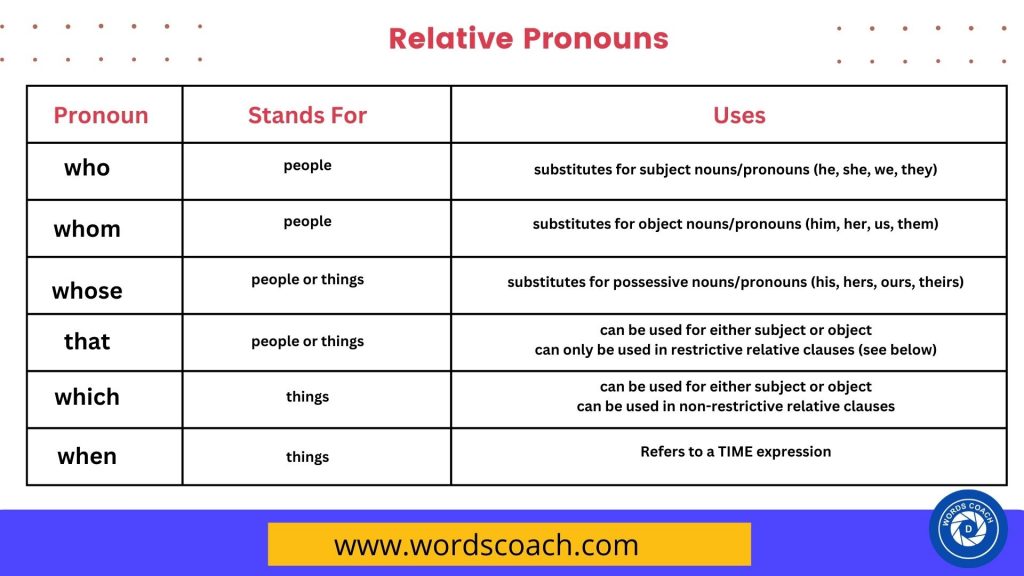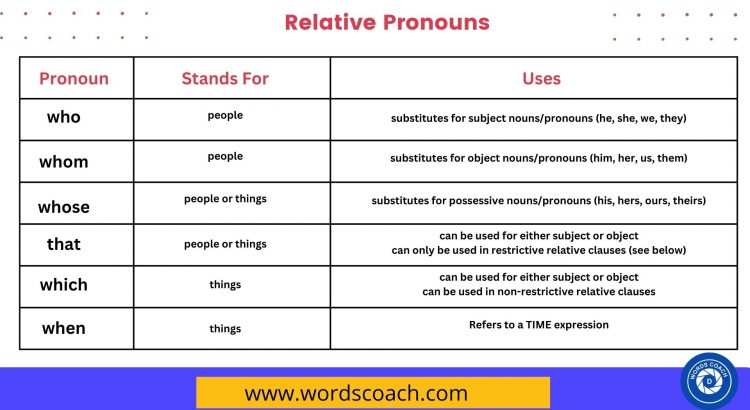What is a Relative Clause? Relative Clause Examples with Answers
A relative clause is a type of dependent clause that typically modifies a noun or a pronoun. It provides additional information about the noun or pronoun, and it begins with a relative pronoun (such as who, whom, whose, that, or which) or a relative adverb (such as where, when, or why).
For example, in the sentence “The woman who is wearing the red dress is my sister,” the relative clause is “who is wearing the red dress.” It modifies the noun “woman” and provides additional information about her appearance.
Relative clauses can be either essential (also called restrictive) or non-essential (also called non-restrictive). An essential relative clause is necessary to the meaning of the sentence and cannot be removed without changing the meaning of the sentence. A non-essential relative clause provides additional information that is not necessary to the meaning of the sentence and can be removed without changing the meaning of the sentence.
For example, in the sentence “The book that I borrowed from the library is due next week,” the relative clause “that I borrowed from the library” is essential because it identifies which book is being referred to. In contrast, in the sentence “My brother, who is a doctor, lives in New York,” the relative clause “who is a doctor” is non-essential because it provides additional information about the brother, but is not necessary to identify which brother is being referred to.
The relative pronouns are:
| Pronoun | Stands For | Uses |
|---|---|---|
| who | people | substitutes for subject nouns/pronouns (he, she, we, they) |
| whom | people | substitutes for object nouns/pronouns (him, her, us, them) |
| whose | people or things | substitutes for possessive nouns/pronouns (his, hers, ours, theirs) |
| that | people or things | can be used for either subject or object can only be used in restrictive relative clauses (see below) |
| which | things | can be used for either subject or object can be used in non-restrictive relative clauses can also be used in restrictive relative-clauses, though some people don’t like this use |
Relative Clause Examples with Answers
Here are some examples of relative clauses with answers:
- The man who delivered the package was very polite. (“who delivered the package” modifies the noun “man”.)
- The dog that barked all night kept the neighbors awake. (“that barked all night” modifies the noun “dog”.)
- The movie which we watched last night was very funny. (“which we watched last night” modifies the noun “movie”.)
- The book whose cover is torn is still a good read. (“whose cover is torn” modifies the noun “book”.)
- The city where I was born is a great place to visit. (“where I was born” modifies the noun “city”.)
- The day when we first met was one of the best days of my life. (“when we first met” modifies the noun “day”.)
- The reason why she left the party early is still a mystery. (“why she left the party early” modifies the noun “reason”.)
- The car that I bought last year has been very reliable. (“that I bought last year” modifies the noun “car”.)
- The girl who won the spelling bee received a trophy. (“who won the spelling bee” modifies the noun “girl”.)
- The restaurant where we had dinner was very expensive. (“where we had dinner” modifies the noun “restaurant”.)
The relative clause modifies a noun or pronoun in the sentence, providing additional information about it.

WHO
- ”Who” is a kind of
relative clause we use when the subject or object we want to describe is a human being. - Relative clauses provide details about the action specified in the preceding clause.
Example Sentences
- The woman who is with the red dress asking me the address was very beautiful.
- My teacher, who came to Spain in 2001, likes to ride her mountain bike.
- I think the people who that live on the island are very friendly.
WHICH
- If the entity we want to characterize in a sentence or want to make it more specific is an inanimate entity, which we usually use.
- Thanks to this, we provide the specific meaning that we provide with who.
Example Sentences
- The car which is standing in front of the apartment is my car.
- The house which we rented was in pink.
- The bananas, which I bought on Monday, are rotten.
- The wallet which I bought last week is already stolen.
Download Word Coach Application Vocabulary Builder and Learn grammar

